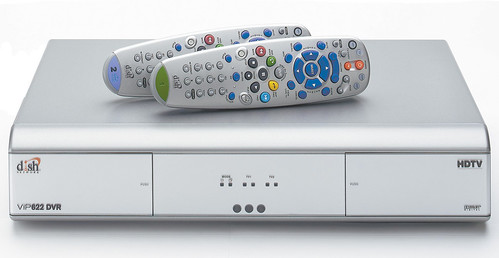The ‘Rocket Docket’ for EchoStar
If this post’s title doesn’t confuse you, EchoStar’s legal battles sure will.
While other Cable and Satellite operators that use DVR technology (including Time Warner, Comcast, and DirectTV) settled with Forgent Networks, which owns a patent on a specific DVR-playback technology, EchoStar didn’t back down. And, last week, EchoStar won:
A team of Morrison & Foerster attorneys and their co-counsel have won dismissal of a patent infringement case brought against client EchoStar Communication Corp. after a Texas jury took just over an hour to find the plaintiff’s patent invalid. It was only the second time on record that a jury in the Eastern District of Texas had handed down a defense win in a patent case by finding the patent at issue invalid.
The court ruled that Forgent’s patent claims against EchoStar were all invalid as anticipated, obvious, and lacking proper written description. The jury instructions describe the legal parameters for "obviousness," but Forgent’s CEO, Richard Snyder, summarizes it best in his company’s recent earnings call: "The outcome of many of these events relating to intellectual property are complex and uncertain."
"Complex" is right. For clarification I turn to Wikipedia: "The inventive step and non-obviousness reflect a same general patentability requirement present in most patent laws, according to which an invention should be sufficiently inventive, i.e. non-obvious, in order to be patented." It appears Forgent’s computer controlled video system that allows playback during recording is not valid for a patent as it is an obvious extension of existing technology. If we have any lawyers in our community, please weigh-in.

By not settling, EchoStar took a big risk. The company faced the prospect of over $200 million in damages if it lost and it’s legal arena was daunting. The Denver Post describes the case’s context:
EchoStar’s hard-line approach isn’t surprising, given its history. The company is known as being litigious, and only rarely does it back down from a legal fight. Founder Charlie Ergen bet the company on a lawsuit in 1997, when he sued Rupert Murdoch’s News Corp. for $5 billion over a failed merger of satellite-TV operations. News Corp. settled.
Drapkin and others called the Forgent verdict an unusual outcome in the Eastern District of Texas, known as the "Rocket Docket" for the speed with which patent cases are handled.
"It’s rare that a defendant would win a jury case in that district … particularly a large company," said Kirstin Stoll-DeBell, of Merchant & Gould in Denver, who represented a client there who settled a patent case. "I think jurors down there are biased against corporate America."
Where does this leave other cases in the DVR-patent war, mainly the TiVo/EchoStar saga which is currently pending in the Federal Circuit Court of Appeals? (Until it considers the case, the court gave EchoStar a stay on an earlier injunction that would force it to turn-off all of its customers’ DVR capabilities.) To be true to this post’s theme, I would have to say…well…unclear.
EchoStar and TiVo both see the light after this Texas ruling and a recent regulatory review of TiVo’s patents. Last week, as part of an ongoing lawsuit filed by TiVo against EchoStar, the U.S. Patent and Trademark Office reviewed 61 of TiVo’s patents and ruled that most (as many as 59), but not all, were valid.
EchoStar spins this their way:
"We are pleased that the United States Patent and Trademark Office yesterday rejected many of TiVo’s patent claims as invalid. That re-examination ruling, together with the favorable decision from the Court of Appeals earlier this month…are steps in the right direction as we prepare our response to TiVo’s recently filed injunction motion,"
TiVo’s CEO, Tom Rogers, argues that their case against EchoStar is:
moving closer to resolution at the Federal Circuit Court of Appeals. AT&T recently attempted to file an Amicus brief [which was denied] supporting EchoStar which speaks to how others perceive the importance of this case. We are actually pleased with EchoStar’s recent victory in another patent case, the Forgent litigation. I say pleased because EchoStar cited as a key defense one of TiVo’s important patents.
Still a little confused? Me too. We will keep you updated as this legal mess unravels in the courts.